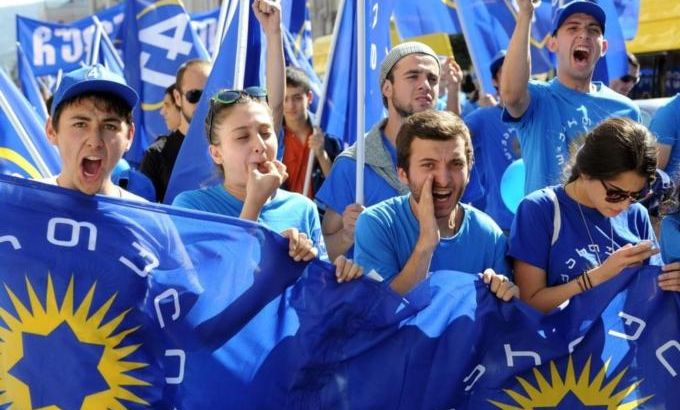Georgia opposition rallies ahead of elections
Supporters of tycoon Ivanishvili rally in Tbilisi against incumbent Saakashvili ahead of Monday’s parliamentary poll.

Tens of thousands of Georgians have joined one of the biggest-ever opposition rallies in the ex-Soviet state on the final day of campaigning before hard-fought parliamentary polls.
Huge crowds packed Tbilisi’s central Freedom Square and the capital’s main street on Saturday to cheer billionaire tycoon Bidzina Ivanishvili, whose opposition Georgian Dream coalition is challenging President Mikheil Saakashvili’s ruling party in Monday’s vote.
Opposition supporters marched on the square in large columns from several locations across the city, wearing his coalition’s t-shirts, carrying the bloc’s banners and flags and chanting “Georgia! Georgia!”
“Saakashvili’s system must be destroyed. The fate of the country is being decided at these elections,” Ivanishvili told the rally. “The day of a new government is coming,” he said.
Thousands of Ivanishvili’s supporters also staged a simultaneous rally in Georgia’s second-largest city, Kutaisi.
Meanwhile, thousands of ruling party supporters gathered in the Black Sea resort city of Batumi, many waving Georgian flags, carrying campaign placards and chanting Saakashvili’s nickname: “Misha! Misha!”
The capital, Tbilisi, long ago turned against Saakashvili, with many people disturbed by what they describe as his authoritarian rule.
Democracy test
Monday’s election is being seen as a test of Saakashvili’s commitment to democracy as he tries to move the country toward closer integration with the European Union and NATO.
Al Jazeera’s Robin Forestier-Walker, reporting from Tbilisi, said Saturday’s huge rally shows some momentum for the opposition, indicating “a lot more spontaneity” compared to the ruling party’s rally.
Our correspondent said; “There is a strong feeling that the opposition is actually going to be doing a lot better as a consequence” of the recent fallout over a prison abuse scandal.
The incumbent leader Saakashvili had warned on Friday that the upcoming parliamentary election threatens to take Georgia back to a dark past of organised crime and Russian domination.
“Never before have we stood before such a choice: To go back to the crime bosses and to being an impoverished country with no electricity and no roads, or to go forward,” Saakashvili told tens of thousands of supporters who packed a Tbilisi sports stadium.
For the West, however, the real question is whether Saakashvili is committed to moving forward on the democratic path that once promised to make Georgia a “beacon of liberty” in the former Soviet Union.
His challenge is not only to win the tightest election he has ever faced, but to prove he can do it fairly and to prevent a repeat of the Rose Revolution that brought him to power after a rigged parliamentary vote nine years ago.
Monday’s election, which has the country on edge, has an added significance because it ushers in a new political system that will give greater powers to both the parliament and prime minister.
After Saakashvili’s second and last term ends next year, the party that enjoys a majority in parliament will have the right to name the prime minister, who will acquire many of the powers now held by the president.
Monday’s vote
“People are really nervous and aggressive,” said Tamar Chugoshvili, who heads the Georgian Young Lawyers’ Association, which has been monitoring the election campaign.
“Anger after the election could lead to civil unrest or even civil war,” Chugoshvili said.
Saakashvili’s party, the United National Movement, now holds nearly 80 per cent of the seats in parliament. Opinion polls diverge widely, with many respondents refusing to state their preference.
Independent observers see the race as too close to call, although they say Saakashvili’s access to state resources gives him the edge.
Many liberal Georgians have turned against Saakashvili, despite the clear achievements of his early years in office.
Fairly quickly after winning election in early 2004, he succeeded in all but eradicating petty corruption, restoring basic public services and enacting reforms that helped to more than triple the size of the economy in five years.
The West cheered his new government, with former US President George W Bush describing Georgia in 2005 as a “beacon of liberty for this region and the world”, as American and European aid and investment flowed in.
Expectations were high, but Saakashvili failed to lift much of the nation out of poverty or create sufficient jobs.